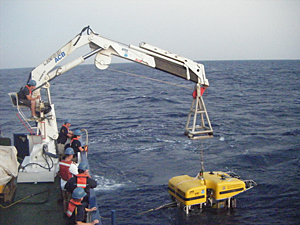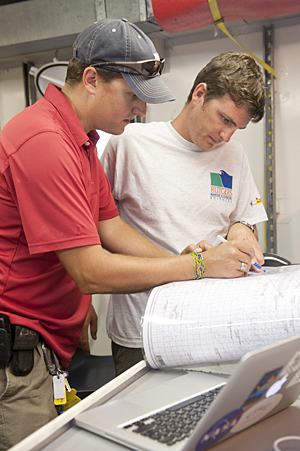
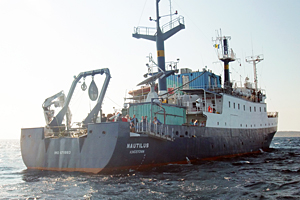
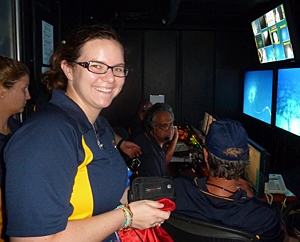
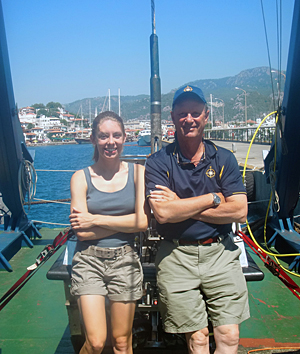
ADVERTISEMENT
- Rozovsky wins prestigious NSF Early Career Award
- UD students meet alumni, experience 'closing bell' at NYSE
- Newark Police seek assistance in identifying suspects in robbery
- Rivlin says bipartisan budget action, stronger budget rules key to reversing debt
- Stink bugs shouldn't pose problem until late summer
- Gao to honor Placido Domingo in Washington performance
- Adopt-A-Highway project keeps Lewes road clean
- WVUD's Radiothon fundraiser runs April 1-10
- W.D. Snodgrass Symposium to honor Pulitzer winner
- New guide helps cancer patients manage symptoms
- UD in the News, March 25, 2011
- For the Record, March 25, 2011
- Public opinion expert discusses world views of U.S. in Global Agenda series
- Congressional delegation, dean laud Center for Community Research and Service program
- Center for Political Communication sets symposium on politics, entertainment
- Students work to raise funds, awareness of domestic violence
- Equestrian team wins regional championship in Western riding
- Markell, Harker stress importance of agriculture to Delaware's economy
- Carol A. Ammon MBA Case Competition winners announced
- Prof presents blood-clotting studies at Gordon Research Conference
- Sexual Assault Awareness Month events, programs announced
- Stay connected with Sea Grant, CEOE e-newsletter
- A message to UD regarding the tragedy in Japan
- More News >>
- March 31-May 14: REP stages Neil Simon's 'The Good Doctor'
- April 2: Newark plans annual 'wine and dine'
- April 5: Expert perspective on U.S. health care
- April 5: Comedian Ace Guillen to visit Scrounge
- April 6, May 4: School of Nursing sponsors research lecture series
- April 6-May 4: Confucius Institute presents Chinese Film Series on Wednesdays
- April 6: IPCC's Pachauri to discuss sustainable development in DENIN Dialogue Series
- April 7: 'WVUDstock' radiothon concert announced
- April 8: English Language Institute presents 'Arts in Translation'
- April 9: Green and Healthy Living Expo planned at The Bob
- April 9: Center for Political Communication to host Onion editor
- April 10: Alumni Easter Egg-stravaganza planned
- April 11: CDS session to focus on visual assistive technologies
- April 12: T.J. Stiles to speak at UDLA annual dinner
- April 15, 16: Annual UD push lawnmower tune-up scheduled
- April 15, 16: Master Players series presents iMusic 4, China Magpie
- April 15, 16: Delaware Symphony, UD chorus to perform Mahler work
- April 18: Former NFL Coach Bill Cowher featured in UD Speaks
- April 21-24: Sesame Street Live brings Elmo and friends to The Bob
- April 30: Save the date for Ag Day 2011 at UD
- April 30: Symposium to consider 'Frontiers at the Chemistry-Biology Interface'
- April 30-May 1: Relay for Life set at Delaware Field House
- May 4: Delaware Membrane Protein Symposium announced
- May 5: Northwestern University's Leon Keer to deliver Kerr lecture
- May 7: Women's volleyball team to host second annual Spring Fling
- Through May 3: SPPA announces speakers for 10th annual lecture series
- Through May 4: Global Agenda sees U.S. through others' eyes; World Bank president to speak
- Through May 4: 'Research on Race, Ethnicity, Culture' topic of series
- Through May 9: Black American Studies announces lecture series
- Through May 11: 'Challenges in Jewish Culture' lecture series announced
- Through May 11: Area Studies research featured in speaker series
- Through June 5: 'Andy Warhol: Behind the Camera' on view in Old College Gallery
- Through July 15: 'Bodyscapes' on view at Mechanical Hall Gallery
- More What's Happening >>
- UD calendar >>
- Middle States evaluation team on campus April 5
- Phipps named HR Liaison of the Quarter
- Senior wins iPad for participating in assessment study
- April 19: Procurement Services schedules information sessions
- UD Bookstore announces spring break hours
- HealthyU Wellness Program encourages employees to 'Step into Spring'
- April 8-29: Faculty roundtable series considers student engagement
- GRE is changing; learn more at April 15 info session
- April 30: UD Evening with Blue Rocks set for employees
- Morris Library to be open 24/7 during final exams
- More Campus FYI >>
2:08 p.m., Sept. 20, 2010----Underwater landslides, deep-sea corals, ancient archaeological sites -- these are just a few of the cool phenomena that Adam Skarke, a graduate student at the University of Delaware, may get to see firsthand in the Mediterranean Sea aboard an expedition led by famed explorer Robert Ballard.
Skarke, who is working on his doctorate in geological sciences at UD's College of Earth, Ocean, and Environment, is now aboard the 211-foot expedition vessel Nautilus, doing research with Ballard's team in the eastern Mediterranean off the coast of Israel.
He is the third graduate student from the laboratory of Art Trembanis, UD assistant professor of geological sciences, to take part in the expedition, which began in June. Nicole Raineault and Stephanie Nebel participated in earlier legs of the expedition in the Aegean Sea.
Skarke is a member of a team of scientists on the expedition's last leg, aiming to learn more about the continental shelf, the undersea extension of the continent. Specifically, the research team is exploring the deep-water portion known as the continental rise, where sediments are deposited from rivers and streams flowing off the continent.
A remotely operated vehicle named “Hercules” will dive on selected areas during the sonar survey to collect detailed visual and geological and biological samples.
A veteran of previous expeditions with Trembanis, his adviser, and Ballard, with whom the UD group collaborates, Skarke says he's most looking forward to studying the unique geological features of the region.
“My interest is sediment transport processes along the continental shelf of the Delaware coast, so what I learn in the Mediterranean may help me in my research at home,” says Skarke, who will return to UD from the expedition in mid-October.
“My work is focused on understanding the form the seafloor takes when estuaries meet the continental shelf. This is a very unique environment in terms of flow processes and morphology. Seafloor ripples, for example, often are generated here. They are a roughness factor that affects the wave energy that makes it to shore, including wave arrivals during storms.”
Trembanis maintains an active collaboration with Ballard's group. In addition to his graduate students' involvement aboard the E/V Nautilus, Trembanis says his students based at UD's Newark campus also have served as scientists on call from UD's telepresence station -- one of only a handful in the world.
“This allows us to have direct HD feeds of the video and audio from the E/V Nautilus and to interact in real time with cruise participants,” Trembanis says. “Our new facility has allowed students -- high school, undergraduate, and graduate students -- and faculty to have an unparalleled access to the exciting discoveries going on aboard the E/V Nautilus, and the research and educational outreach opportunities are just fantastic.”
Trembanis's Geology 467/667 Data Visualization Class is taking data feeds from the E/V Nautilus and creating immersive 4-dimensional visualizations of what is going on during the cruise.
Additionally, on Oct. 5, his Geology 434/634 class will be standing watch remotely from the new telepresence lab.
You can follow the program at the Nautilus Live website.
Ballard was presented an honorary doctor of science degree by the University of Delaware in 2001.
Article by Tracey Bryant



